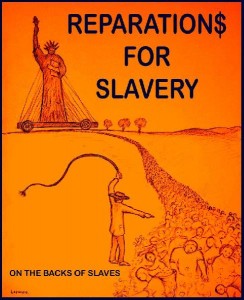(ThyBlackMan.com) A caller on the Carl Nelson Show (WOL 1450AM – Washington, D.C.), at least each time I have heard him, talks about reparations and freedom. He called again when I was Carl’s guest on July 16, 2014. The caller’s passion, concern, anger, urgency, and frustration were all woven into his comments. I could not help but empathize with his position, nor could I refute what he was saying despite his angry tone. He did apologize for the way he spoke, but both Carl and I told him there was no need to apologize. We definitely understood the reasons for his tone.
That brother’s comments stayed on my mind throughout that night, and I kept thinking about the true meaning of freedom as it pertains to Black people in this country. Notwithstanding the acclaimed piece on reparations by Ta-Nehisi Coates, it is time once again to write something on reparations, as I have done many times during the twenty-one year tenure of this column.
Having said for years that the culmination of true freedom, especially for Black people in the U.S., is economic freedom, I often imagine what our enslaved ancestors did when they were told they were “free.”
If all you have ever known are the limits of a plantation, where do you go when you are set free? If you have never had money and are given none when set free, what do you do? If you have no land of your own and don’t know any other enslaved person (or free for that matter) who has land, how will you feed yourself and where will you live? Free? That’s a very relative term.
relative term.
Nonetheless, many formerly enslaved Africans in America answered those questions by striking out, despite the circumstances of their newfound freedom, for parts and conditions unknown. They figured it out as they went along. Some walked until they ran out of land, all the way to Nova Scotia. Some went to Ontario and western Canada. Some stayed on the plantations to scrape out a living as sharecroppers, and others maintained hope in General Sherman’s Special Orders that promised some 400,000 acres of land to formerly enslaved Africans, from Charleston, South Carolina to Jacksonville, Florida, in “Forty Acre” plots. President Andrew Johnson rescinded those orders.
Efforts by Thaddeus Stevens and Charles Sumner to obtain reparations through Congress failed, and Black folks were disenfranchised once again, “freed” and left to fend for themselves in an environment that had little or no regard for their lives other than how much money it could continue to earn from their labor. Interestingly, prison “farms” were opened and many Black people were sent to them to be leased out as prison slaves.
The caller on Carl Nelson’s show suggested we take the reparations issue to the courts. I asked, “Who controls the courts?” Can you imagine pleading reparations before the current cast of Supremes? Charles Ogletree took the reparations case for the 1921 Tulsa, Oklahoma riot survivors to the Supreme Court. He would later write “…without a word or a hearing, the Supreme Court refused to consider the case.”
How about the International Courts then? After being turned down by the SCOTUS, Ogletree petitioned the Organization of American States International Court that reviews claims of discrimination against people of African descent. No reparations for riot survivors granted yet, folks; and their case is only ninety-three years old, not 149 years old. Immediately following the riot, the President of the Tulsa Chamber of Commerce said, “The deplorable event is the greatest wound Tulsa’s civic pride has ever received. Leading businessmen are in hourly conferences and a movement is now being organized… to formulate a plan of reparation.” Yeah, right.
Reparations for Blacks can (and should) be given in several forms other than cash, i.e. tax abatements, education tuition benefits, land grants, and business subsidies. Whatever the means, reparations should be paid for the 250 years of free labor that brought tremendous wealth to this country. Our current President does not support reparations, the courts have demonstrated their recalcitrance on the issue, Congress will not take up John Conyers’ HR 40, and Ta-Nehisi Coates’ article, while it is great, has a very limited shelf life. You know how short our attention spans are.
Could reparations truly make us “free”? I say, “Yes,” but in a larger more collective context. To quote Coates, “Reparations could not make up for the murder perpetrated by the Nazis. But they did launch Germany’s reckoning with itself, and perhaps provided a road map for how a great civilization might make itself worthy of the name…More important than any single check cut to any African American, the payment of reparations would represent America’s maturation out of the childhood myth of its innocence into a wisdom worthy of its founders.”
Written By James E. Clingman
Official website; http://www.blackonomics.com/

















Go to an Indian reservation, and see what reparations actually do. Blacks may live in slums and ghettos, but there’s pavement and sidewalks and tenements. The natives have shacks and dirt.
If you don’t work for it, you won’t value it. Lottery winners always wind up poor.
A good recent article about reparations is http://www.theatlantic.com/features/archive/2014/05/the-case-for-reparations/361631/
This is the Best Approach .. But We Are ” Scared ” to Try it because those Africans are’nt gonna keep arguing with us like these white people have
http://newsblaze.com/story/20140419055406king.nb/topstory.html
Re: Papacool, Oprah would probably avoid such a gathering. Good idea though.
If history has shown us anything, we are all aware of what happens went we want things to be fair and equitable. We always get the short end of the stick, either by those in charge or by our own hands. First of all, an admission would have to be made that slavery was wrong. Ain’t happening. Secondly, Congress would have to vote in a measurement to ensure legislation, and if the actions of this present Congress is any indication of what we can expect, we are doomed.
Obama would have the right to exercise his Executive Priviledge to do something, but this would ensure his immediate demise. Other races have been approved for reparations suchur as the Jews, the Japanese, and the American Indians. Our plight is known the world over and we have not received anywhere near the level of attention to this matter that this matter is due. The current crisis of the illegal border crossings of the people from Central America is getting more headlines than the slavery reparations issue. While on that point, remember how Haitians were turned back and prevented from receiving political asylum although they had valid reasons to stay. Like all other important life changing matters, we can not seem to have an intelligent sit down and honestly discuss the issue.
Our contributions to the building of this country have always been trodded on and downplayed. While any statistics of welfare or imprisonment can be made readily available. Get a panel with Dick Gregory, Paul Mooney, Louis Farrakhan, and Tavis Smiley to get this ball rolling and of course, Oprah Winfrey. Peace out, Papacool.
Realman. I have heard that argument before (Blacks will just waste it) and it is a terrible argument and one that doesn’t make sense. I presupposes that all Blacks have not ability to manage and use money and that just isn’t true.
I wrote a great article debunking the argument you just made.
Terrance I agree. I think it is a rabbit trail. I think we should get it and it would be tremendously beneficial it just won’t ever happen so it is not something to focus on.
Reparations is Nothing More Than “Risk Capital.”
The 40 acres and a mule promised blacks is risk capital not received. It is a stake at the table of capitalism. White racists and I say white racists specifically, because all whites are not racists, can control who are major players in the game of capitalism by controlling who gets a stake. It is the biggest open secret in the world. At this time, the major capitalist nations of the world are attempting to restrict Russia’s ability to sit at the table of capitalism by in essence saying we will not allow you and your country’s major corporations access to our capital markets. In saying this, and I take no position on the matter but I merely point out how capital markets can be manipulated to achieve an objective. They are restricting Russia’s ability to raise money by placing limitations on their efforts to sell bonds, stocks and settle debts, because for the most part these activities are done through European and American based banks and investment companies. They are not honoring checks originating with some Russian government banks and companies. If you can’t do these things, you cannot effectively conduct business throughout the world.
Thus, your country suffers economically. The same thing was done in Africa, however, in different ways. When African nations headed by black leaders, some democratically elected, needed revenue to develop their resources (you can have great amounts of mineral resources but if you can’t get them out of the ground – they are useless) it was done on terms that advantaged and enriched the capitalist markets controlled by the Europeans, Canada, Australia and the United States. China is creating havoc in this set-up because it now is dealing with African nations on terms that suit it and they are more liberal. Thus it is forcing for the first time the Europeans, the United States and its allies to deal more fairly with Africa when it comes to raising money. Africa’s ability to be a major player economically in the world will depend on in part how well it can manipulate China and the Europeans-the United States and its allies in this game of capitalism, as it forces them to give it a seat at the table. Blacks are uniquely positioned in the United States to turn this system to their advantage, if they would start thinking like capitalists. What blacks in the United States need is a stake, risk capital if you will.
Reparations does not stand a snowball chance in hell of getting blacks that stake. But once blacks get a stake, they can use constitutional law and the courts to force racist banks to give them loans to start businesses. Make no mistake, racist lending institutions will be the next battle front, but a much less difficult one than that of getting a stake. Why? Banks are required to keep records and records can expose racist lending patterns. When thinking as a capitalist, you come to realize money can be gotten in various ways such as the saving and loan scandal during the Reagan administration which cost you as taxpayers $100 billion dollars in bad loans, almost all of which went to well connected white businessmen. If you focus on the bad loans, you miss the point. One out approximately seven business deals fail. Using this as measure, it means white businessmen during President Reagan’s tenure got away with a stake of $700 billion dollars!!
Many white businesses today owe their start to President Reagan. Now, you can understand why they love Reagan! The Davis Deficit Neutral Job Creation plan (https://thyblackman.com/2013/08/15/40000-00-to-each-black-person-retirement-is-the-answer/)
is a means through which much needed capital can be placed in blacks hands bypassing racist whites, however it needs your support. Getting money is getting money as we have seen with the saving and loan scandal. What you do with it makes all the difference in the world.
This plan will pump as much forty million dollars a day directly into black communities across this country for as many 18 years or even longer. That does not sound like much, does it?! Do the math. Forty million dollars multiplied by 365 days (one year) works out to $14.6 billion a year. Over tens years, that means, $146 billion dollars would be placed directly into black hands bypassing the capricious nature of white racists. Look, money is money….getting it is important!
Can any of you think of a better way of putting $14.6 billion dollars in black hands a year. Without “risk capital” we are going to go no where as the last 50 years has shown us. http://www.Jobcreationnow.com
I’m for reparations but not in a financial payment form, because most Negroes would waste it all on something stupid and white people would have all the money back in their hands within 2 days.
I support it, but I don’t think we’ll ever get reparations, at least not to the degree we deserve to. But then again, who ever thought we’d have a Black president? I do know a guaranteed way we can get reparations without asking for it. We have to start owning businesses the mainstream loves to support like, sports teams, movie studios,tv networks, clothing lines, banks, insurance companies, and many more.
If we only knew our value, we’d be major owners in these fields, instead of employees’s, endorsers and promoters of them. But it’s never too late to do the right thing, especially if it can change the course of a community’s economic problems. This is the course I choose to take. How about you? 2014 will be the beginning of positive change. Look for the news.
Black Unity means financial independence and happiness